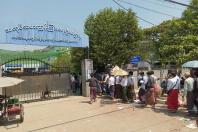School homework, use of electronic devices are major causes, report says.
More than 60 percent of children and teens do not get adequate sleep, which can put their health at risk, according to a report released on Sunday by the Chinese Sleep Research Society, ahead of the World Sleep Day that falls on March 21.
Nearly 63 percent of Chinese youths ages 6 to 17 sleep less than eight hours a day, according to the report. Among 13- to 17-year-olds the figure is more than 81 percent.
The report was based on a survey at the end of last year and in January. It covered nearly 70,000 children and teens ages 6 to 17 across the Chinese mainland, Hong Kong, Macao and Taiwan.
The report found that the heavy school homework load and the popularization of electronic devices were the two top causes for the inadequate sleep. From Monday to Thursday, 8.4 percent of the group would still be busy with their homework after 11 pm.
More than 41 percent of children and teenagers who sleep too little use electronic devices such as computer tablets and mobile phones, the survey found, and youths whose parents use smartphones in front of them are more likely to have less sleep.
Other factors, such as noise and light pollution, contributed to the problem, the report said.
The survey also indicated that good sleep results in higher efficiency in study. Students who sleep longer generally finish homework in two and three hours per day, while those who sleep less require four to six hours.
Gao Xuemei, vice-president of the society, said studies have shown that decreasing sleeping time for children and teenagers has been a global trend in the past 10 years, but the problem appears to be worse in East Asia, including China, largely due to a heavier load of school homework.
"Lack of sleep among children and teenagers deserves high attention, because it can seriously affect their health and growth," she said. Such a group should sleep at least eight hours a day, she added.
Zhao Zhongxin, a professor specialized in treating sleep disorders at Shanghai Changzheng Hospital, said getting adequate sleep is very important.
"Sleep promotes growth, protects the brain and improves the immune system," he said. "Long-term deprivation of sleep will bring risks of diseases and conditions such as dementia and cause lasting health damage."
Wang Guanghai, a member of the Chinese Sleep Research Society and a psychological consultant, said the excessive use of electronics products in China is depriving children and teens of sleeping time.
"Some of them use tablets for more than four hours a day," he said. "It has become a serious problem that affects minors' health."
He suggested that local education authorities across China take more measures to help students get more sleep, including delaying the start of morning classes by half an hour.
http://www.chinadaily.com.cn/a/201903/18/WS5c8eef6ca3106c65c34ef175.html










